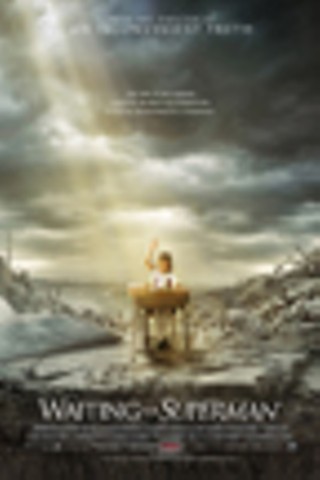The public-education system in the United States has a total enrollment of about 55 million children, with hundreds of billions of dollars spent on their schooling each year. If the system is broken, it will undoubtedly take more time, money and effort than any single solution can hold.
Of course, the system is broken; there's no question about it anymore. And public education is failing students, parents, communities, teachers, taxpayers in general, the workforce and American innovation.
Because planting a flag in the dirt and proclaiming to know the way out of such a morass would seem like a fool's errand, Davis Guggenheim's Waiting for "Superman" doesn't try to fix anything. It does, however, point out a few isolated success stories as possible alternatives to the current public-schools debacle, and it points a finger, rather deliberately, at two organizations that could be holding back the cause—and increasing the cost—of reform.
Guggenheim won an Oscar a few years ago for Al Gore's An Inconvenient Truth, a better-directed documentary than it needed to be, considering half of it was a PowerPoint presentation. Because he has graduated from being an episodic director on television, Guggenheim can effectively establish concurrent storylines to tackle a massive problem on multiple personal levels. Charting students in New York City, Washington, D.C., Los Angeles and the Silicon Valley, the director highlights a handful of wrong turns that the education system has made as it has failed to produce more engaged and more prepared graduates—if they graduate at all, that is.
While the problems might be more visible in those massive urban areas, some of the worst test scores come from the Deep South—and Western states like Arizona—which Guggenheim readily points out through a combination of his own narration and snappy infographics. Perhaps there's some unintentional irony in implementing attention-grabbing visuals to make the film's concepts and statistics easier to grasp.
Asking for an already effective film to be longer is usually ill-advised, but a nationwide crisis is a nationwide crisis; it doesn't solely exist on the coasts, and certain problems experienced in rural areas might not be common in large cities. Guggenheim's strategy all but forgets small towns, and that seems like a slight given the weight he gives, of all things, a Marin County junior high student at a school performing in the 94th percentile in the nation—but whose parents think she can do better across the street. What a struggle.
Any good documentarian knows that the nuts and bolts of the issue will only go so far, and that at a certain point, a nonfiction film operates in the same way any other movie does: If it's not believable through the eyes of a character on screen, it's not believable. Guggenheim has cultivated a bumper crop of characters—not only students, but their parents, and most inspiringly, educators and reformers like Geoffrey Canada and Michelle Rhee, who are pushing back against The Way It's Always Been to find new remedies.
It's Canada who coins the title of the film, recounting the moment from his youth in the economically depressed Bronx when his mother told him Superman wasn't real. His disappointment, Canada says, wasn't that Superman was a made-up figure, but rather that no one would ever come along to fix all of the world's problems. A progenitor of the modern charter-school concept, Canada started the Harlem Children's Zone, targeting what was then the worst school district in the United States. He vowed to not only raise grades and graduation rates, but to follow the progress of every student in the program from preschool through college graduation. HCZ currently outperforms the national average by a considerable margin, and its model has been implemented in several cities across the country.
Conversely, the struggle of Washington, D.C., superintendent Michelle Rhee is more political. A firebrand with no previous experience in this arena, Rhee was hired in 2007, and she set about radically altering the staid school system. Restructuring and cutting waste were her two biggest fights in the beginning, but now she's focused on breaking the teachers unions' stranglehold on education. According to Rhee, and underlined by Guggenheim, the two powerful unions—the American Federation of Teachers and the National Education Association—stand in the way of progress in a lot of ways, most notably a tenure provision that keeps even the worst teachers from being held accountable. One in 2,500 teachers might lose his or her job based on performance, or lack of it. That's a lot of students potentially left in the dark.
Waiting for "Superman" is, not surprisingly, incredibly educational. It's sobering to see what some students have to go through outside of class just to try to reach some modicum of their potential. But in a system that seems not to care, how far will that carry them? Davis Guggenheim doesn't have an answer, but he does offer several ideas. And given the circumstances, isn't any new idea a good one?











